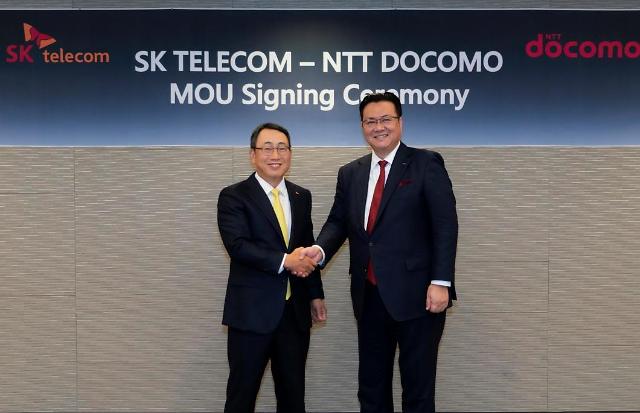
[Courtesy of SK Telecom]
SEOUL — Top mobile operations in South Korea and Japan established a strategic alliance to promote close cooperation and seek synergy in metaverse, media and telecommunications infrastructure businesses. They will promote strategic investment and cooperation in the production and distribution of content targeting the global media market.
Under a memorandum of understanding signed on November 21, SK Telecom (SKT) and NTT Docomo would cooperate in content, technology, and service to upgrade each other’s metaverse service. They will consider jointly producing content for metaverse and discuss ways to connect their services and conduct joint marketing.
The metaverse is a collective virtual shared space, created by the convergence of virtually enhanced physical reality and physically persistent virtual space. It describes a future internet of persistent, shared, 3D virtual spaces linked into a perceived virtual universe. SKT has tried to boost the popularization of its metaverse platform, Ifland, by running special programs.
The two companies agreed to jointly secure intellectual property for games and animations popular in both countries or jointly invest in metaverse-related content providers and extended reality device manufacturers. “This MOU is very important in that it is an all-round cooperation in the ICT field between telecommunication companies,” SKT CEO Ryu Young-sang said in a statement.
SKT and NTT Docomo will discuss ways to create synergy between their over-the-top (OTT) services by co-producing original content such as dramas and entertainment and providing them exclusively to South Korea and Japan. If Hallyu (Korean cultural wave) content is provided to Japan, Wavve, an integrated OTT service in South Korea, can pioneer overseas sales while NTT Docomo can increase subscribers.
“We look forward to creating new services and businesses in the global market through the technology and business experience know-how of the two companies, and to impressing many customers with state-of-the-art services,” said NTT Docomo president Motoyuki Ii.
Other areas of cooperation will be joint research on 6G technologies as they prepare for a successful 6G era together by cooperating with the use case that 6G should provide in the future, and joint work to reflect the major requirements of customers and businesses in the global standardization organization and industry.
Both companies will secure technologies related to open radio access network (O-RAN or ORAN) and virtual RAN, which will be in full swing in 6G, focus their capabilities on the research and development of next-generation mobile networks by innovating the mobile network structure into a cloud environment and jointly developing transmission network technology.
RAN resides between a device such as a mobile phone, a computer, or any remotely controlled machine and provides a connection with its core network. The Open RAN (O-RAN or ORAN) Alliance is a global carrier-led effort to drive new levels of openness in the radio access network of 5G wireless systems. It aims to make radio access networks more open and smarter than previous generations.
Software-based virtualized RAN (vRAN) moves the controller functions of hardware base stations to centralized servers, bringing them closer to the edge of a network to allow mobile network operators to pool and adjust radio resources to better accommodate for user traffic.
© Aju Business Daily & www.ajunews.com Copyright: All materials on this site may not be reproduced, distributed, transmitted, displayed, published or broadcast without the authorization from the Aju News Corporation.
Read More: news.google.com








 Bitcoin
Bitcoin  Ethereum
Ethereum  Tether
Tether  XRP
XRP  Solana
Solana  USDC
USDC  Dogecoin
Dogecoin  Cardano
Cardano  TRON
TRON  Lido Staked Ether
Lido Staked Ether  Wrapped Bitcoin
Wrapped Bitcoin  Sui
Sui  Wrapped stETH
Wrapped stETH  Chainlink
Chainlink  Avalanche
Avalanche  Stellar
Stellar  Hyperliquid
Hyperliquid  Shiba Inu
Shiba Inu  Hedera
Hedera  LEO Token
LEO Token  Bitcoin Cash
Bitcoin Cash  Toncoin
Toncoin  Litecoin
Litecoin  Polkadot
Polkadot  USDS
USDS  WETH
WETH  Monero
Monero  Binance Bridged USDT (BNB Smart Chain)
Binance Bridged USDT (BNB Smart Chain)  Bitget Token
Bitget Token  Wrapped eETH
Wrapped eETH  Pepe
Pepe  Pi Network
Pi Network  Ethena USDe
Ethena USDe  Coinbase Wrapped BTC
Coinbase Wrapped BTC  WhiteBIT Coin
WhiteBIT Coin  Bittensor
Bittensor  Dai
Dai  Uniswap
Uniswap  Aave
Aave  NEAR Protocol
NEAR Protocol  Aptos
Aptos  OKB
OKB  Jito Staked SOL
Jito Staked SOL  Ondo
Ondo  Cronos
Cronos  BlackRock USD Institutional Digital Liquidity Fund
BlackRock USD Institutional Digital Liquidity Fund  Tokenize Xchange
Tokenize Xchange  Internet Computer
Internet Computer